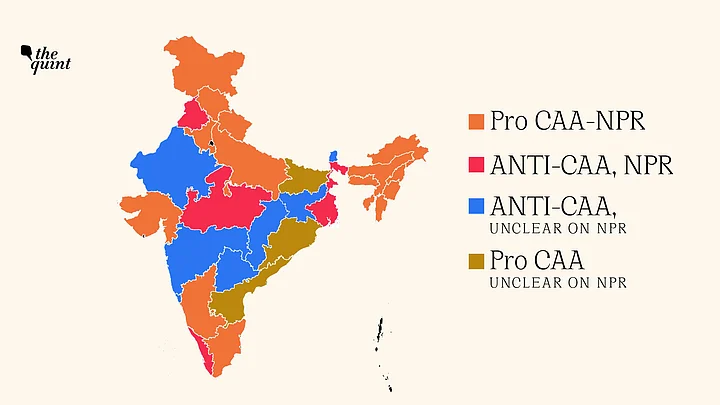(The map in the article pertains to the stand the governments of these states and Union Territories have taken as of 20 February 2020).
India has been witnessing widespread protests against Citizenship Amendment Act (CAA), National Register of Citizens (NRC) and National Population Register (NPR) for close to two months now. Different state governments have taken different positions regarding the CAA and NPR.
Chief ministers of some states have refused to implement NPR and CAA. Certain states have meanwhile, taken an anti-CAA position, but have maintained ambiguity on whether or not they would implement NPR .
Anti-CAA protests have gripped the country since December last year. The Citizenship (Amendment) Act seeks to fast-track citizenship for persecuted Hindus, Parsis, Sikhs, Buddhists, Jains and Christians who came to India before December 31, 2014.
Amidst this turmoil, several states have made clear their stand on the issue, while some have maintained a tacit silence. This GIF shows the different positions taken by governments of different states and Union Territories as of 20 February:
BJP-Ruled States — All for CAA, NPR
Not surprisingly, all the BJP-ruled states have given a green signal for CAA, NPR. In states like Bihar, which is ruled by its ally J(DU), their position on the issue is ambiguous. Protesters have repeatedly asked Bihar CM Nitish Kumar to clarify his stand on the issue.
Meanwhile, in Himachal Pradesh, the process for the updation of the NPR will begin from 16 May to 30 June under phase 1.
In PM Modi and Home Minister Amit Shah's bastion Gujarat, the Legislative Assembly even passed a resolution congratulating the PM and home minister over the passage of CAA in the Parliament in December last year.
Karnataka chief minister BS Yediyurappa led a door-to-door campaign in January, to allay people's apprehensions about the contentious citizenship law.
BJP leaders have echoed PM Modi’s words and have maintained that the Muslim community would not be affected by the CAA or NPR.
Firm ‘No’ From Some State Govts, Others Yet to Take Final Call
A few states like Punjab, West Bengal, Kerala and Madhya Pradesh have passed a resolution against CAA, and have explicitly criticised the amended Citizenship law and NPR.
In fact, Rajasthan has also passed an anti-CAA resolution, but according to the officials of the directorate of census operations, the Congress-led state government is yet to take a call on NPR.
Telangana Chief Minister K Chandrashekhar Rao (KCR) had announced that the state will bring an anti-CAA resolution in their Assembly. He, however, hasn't spoken about NPR yet.
Certain states have been going back and forth on the issue, either because they are still gauging the mood of the public or there is a lack of consensus within their own party.
In Andhra Pradesh, Chief Minister Jagan Mohan Reddy had said that his state will not support NRC. He, however, announced that the NPR exercise would be carried out for a period of 45 days as part of the Census of India 2021.
As for the Northeastern states, protests against CAA have refused to die down in BJP-ruled Assam. Meanwhile, states like Mizoram, Nagaland, Manipur and Arunachal Pradesh come under Inner Line Permit (ILP), and hence have been exempted from CAA by the government.
The question now is, will the protests compel states, having a non-BJP government, to oppose NPR? Or will the Narendra Modi-led government succeed in pushing it through?
(With inputs from The News Minute, India Today, Hindustan Times)
(At The Quint, we question everything. Play an active role in shaping our journalism by becoming a member today.)
